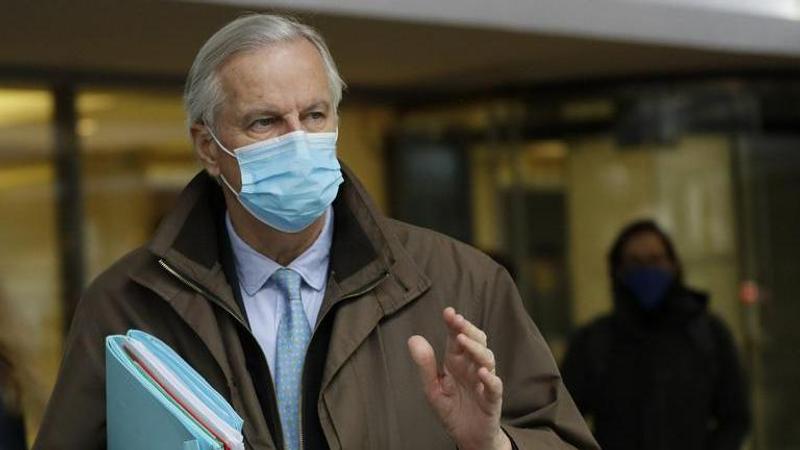Published 15:13 IST, December 5th 2020
UK-EU trade talks 'paused' with deal still elusive
A week of intense trade talks between Britain and the European Union ended in stalemate Friday, with negotiators stepping back while politicians decide whether major differences can be bridged to avoid a messy, economically disruptive rupture in less than a month.

A week of intense trade talks between Britain and the European Union ended in stalemate Friday, with negotiators stepping back while politicians decide whether major differences can be bridged to avoid a messy, economically disruptive rupture in less than a month.
EU chief negotiator Michel Barnier and his British counterpart, David Frost, said they had agreed to “pause” negotiations while they brief the two sides' political leaders. They said British Prime Minister Boris Johnson and European Commission President Ursula von der Leyen will discuss the state of play on Saturday.
“After one week of intense negotiation in London, the two chief negotiators agreed today that the conditions for an agreement are not met, due to significant divergences on level playing field, governance and fisheries,” Frost and Barnier said in a joint statement .
Talks have seesawed between progress and setbacks all week, as Barnier, Frost and their teams holed up in a London conference center, fueled by deliveries of sandwiches and pizza.
British Business Secretary Alok Sharma said earlier Friday that talks were “in a difficult phase,” while France warned it could veto any agreement it didn’t like.
UK officials briefed media outlets that the EU had set back negotiations by making last-minute demands — an allegation the bloc denied.
The UK left the EU early this year, but remains part of the 27-nation bloc’s economic embrace during an 11-month transition as the two sides try to negotiate a new free-trade deal to take effect Jan. 1. Any deal must be approved by lawmakers in Britain and the EU before year’s end.
Talks have dragged on as one deadline after another has slipped by. First, the goal was a deal by October, then by mid-November. On Sunday, Britain said the negotiations were in their final week.
European Council President Charles Michel noted that it wasn’t the first time that deadlines had slipped.
“We will see what will happen in the next days,” he said in Brussels. “But the end of December is the end of December and we know that after the 31st of December we have the 1st of January, and we know that we need to have clarity as soon as possible.” A trade deal will allow goods to move between Britain and the EU without tariffs or quotas after the end of this year, though there would still be new costs and red tape for businesses on both sides of the English Channel.
If there is no deal, New Year’s Day will bring huge disruption, with the overnight imposition of tariffs and other barriers to U.K.-EU trade. That will hurt both sides, but the burden will fall most heavily on Britain, which does almost half its trade with the EU.
Months of tense negotiations have produced agreement on a swath of issues, but serious differences remain over the “level playing field” — the standards the U.K. must meet to export into the bloc — and how future disputes are resolved. That’s key for the EU, which fears Britain will slash social and environmental standards and pump state money into U.K. industries, becoming a low-regulation economic rival on the bloc’s doorstep.
But the UK government, which sees Brexit as all about “taking back control” from Brussels, is resisting curbs on its freedom to set future economic policies.
Another sticking point is fish, a small part of the economy with an outsized symbolic importance for Europe’s maritime nations. EU countries want their boats to be able to keep fishing in British waters, while the UK insists it must control access and quotas.
Fishing is especially important to France, which is seen by many on the UK side as the EU nation most resistant to compromise.
“If there was to be an agreement and it was not good ... we would oppose it,” Clement Beaune, France’s junior minister in charge of European Affairs, told Europe 1 radio. “France like all its (EU) partners has a veto right.” If there is no breakthrough this weekend, next week will bring more complications. On Monday Britain's House of Commons will vote on a bill that gives Britain the power to breach parts of the legally binding withdrawal agreement it struck with the EU last year.
Johnson’s government acknowledges that the Internal Market Bill breaches international law, and the legislation has been condemned by the EU, U.S. President-elect Joe Biden and scores of British lawmakers, including many from Johnson’s own Conservative Party.
The House of Lords, Parliament’s upper chamber, removed the law-breaking clauses from the legislation last month, but Johnson’s government says it will ask lawmakers to reinsert them.
That would further sour the talks, demolishing any good will that remains between the two sides.
German government spokesman Steffen Seibert stressed that EU nations wanted a deal, "but not at any cost.” “And of course we must also prepare for all scenarios, including for the possibility that there won’t be an agreement," he said.
(Image Credit: AP)
Updated 15:13 IST, December 5th 2020




